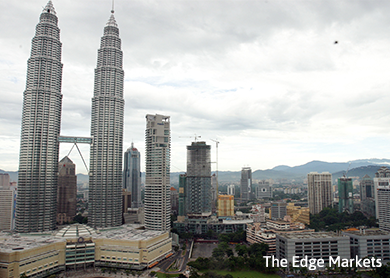
KUALA LUMPUR (May 27): Moody’s Investors Service expects Malaysia to continue to demonstrate macroeconomic resilience — namely, moderating but still positive gross domestic product (GDP) growth, low inflation rates, and a sustained current account surplus — despite an adverse external environment and slower domestic consumption.
In a report on May 26, Moody’s said this situation should ensure a reasonably supportive backdrop for rated issuers.
Moody’s said it expects the external environment to remain challenging over the coming quarters, on the back of weak energy prices and the likelihood of monetary tightening in the US.
“Such an environment is likely to hurt revenues of the sovereign and energy major Petroliam Nasional Berhad (A1 stable) this year and the next.
“Similarly, debt levels are at risk of rising for plantation companies due to lower earnings before interest, tax, depreciation and amortisation (EBITDA) and cash generation, as a result of weaker palm oil prices,” it said.
Nevertheless, it said most Moody's-rated entities would absorb adverse external conditions over the coming quarters, due to their low exposure to commodity price and exchange rate volatility.
Moody’s explained that the financial troubles of the government-owned fund, 1Malaysia Development Berhad (1MDB, unrated), were not symptomatic of the health of most government-linked corporations (GLCs).
“Aside from 1MDB, GLCs have continued to service their outstanding debt due to their solid track record of corporate governance and profitability, and no guarantees have yet to crystallise on the government’s balance sheet,” it said.
The credit rating agency said it expects private consumption growth to weaken in the coming quarters, in the wake of the implementation of the goods and services tax (GST) in April 2015, as well as the high levels of household debt; both factors of which will weigh on headline economic expansion.
However, it said the impact of a weak consumer on the banks and corporates was unlikely to prove a major credit stress.
Moody’s said that in the event that global commodity prices, particularly oil, correct significantly and remain depressed over the course of 2015 and 2016, Malaysia could experience both twin fiscal and current account deficits and renewed capital outflows.
“While not our baseline scenario, such a situation would lead us to reconsider our core views of relative stability for the sovereign and rated entities in Malaysia over the coming quarters,” it said.